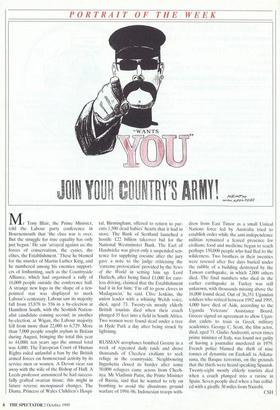PORTRAIT OF THE WEEK
Mr Tony Blair, the Prime Minister, told the Labour party conference in Bournemouth that 'the class war is over. But the struggle for true equality has only just begun.' He saw 'arrayed against us: the forces of conservatism, the cynics, the elites, the Establishment.' These he blamed for the murder of Martin Luther King, and he numbered among his enemies support- em of foxhunting, such as the Countryside Alliance, which had organised a rally of 16,000 people outside the conference hall. A strange new logo in the shape of a ten- pointed star was displayed to mark Labour's centenary. Labour saw its majority fall from 15,878 to 556 in a by-election at Hamilton South, with the Scottish Nation- alist candidate coming second; in another by-election, at Wigan, the Labour majority fell from more than 22,000 to 6,729. More than 7,000 people sought asylum in Britain during August, bringing the total this year to 44,000; ten years ago the annual total was 4,000. The European Court of Human Rights ruled unlawful a ban by the British armed forces on homosexual activity by its service men or women. A Devon vicar ran away with the wife of the Bishop of Hull. A Leeds professor announced he had success- fully grafted ovarian tissue; this might in future reverse menopausal changes. The Diana, Princess of Wales Children's Hospi- tat, Birmingham, offered to return to par- ents 1,500 dead babies' hearts that it had in store. The Bank of Scotland launched a hostile £22 billion takeover bid for the National Westminster Bank. The Earl of Hardwicke was given only a suspended sen- tence for supplying cocaine after the jury gave a note to the judge criticising the 'extreme provocation' provided by the News of the World in setting him up. Lord Harlech, after being fined £1,000 for care- less driving, claimed that the Establishment had it in for him; 'I'm off to grow cloves in Madagascar,' he said. Clive Jenkins, the union leader with a whining Welsh voice, died, aged 73. Twenty-six mostly elderly British tourists died when their coach plunged 35 feet into a field in South Africa. Two women were found dead under a tree in Hyde Park a day after being struck by lightning.
RUSSIAN aeroplanes bombed Grozny in a week of repeated daily raids and drove thousands of Chechen civilians to seek refuge in the countryside. Neighbouring Ingushetia closed its border after some 50,000 refugees came across from Chech- nya. Mr Vladimir Putin, the Prime Minister of Russia, said that he wanted to rely on bombing to avoid the disastrous ground warfare of 1994-96. Indonesian troops with- drew from East Timor as a small United Nations force led by Australia tried to establish order while the anti-independence militias remained a feared presence for civilians; food and medicine began to reach perhaps 150,000 people who had fled to the wilderness. Two brothers in their twenties were rescued after five days buried under the rubble of a building destroyed by the Taiwan earthquake, in which 2,000 others died. The final numbers who died in the earlier earthquake in Turkey was still unknown, with thousands missing above the 16,000 found dead. Out of 36,351 Ugandan soldiers who retired between 1992 and 1995, 4,000 have died of Aids, according to the Uganda Veterans' Assistance Board. Greece signed an agreement to allow Ugan- dan cadets to train in Greek military academies. George C. Scott, the film actor, died, aged 71. Giulio Andreotti, seven times prime minister of Italy, was found not guilty of having a journalist murdered in 1979. French police blamed the theft of nine tonnes of dynamite on Euzkadi ta Askata- suns, the Basque terrorists, on the grounds that the thiefs were heard speaking Spanish. Twenty-eight mostly elderly tourists died when a coach plunged into a ravine in Spain. Seven people died when a bus collid- ed with a giraffe 30 miles from Nairobi.
CSH










































































 Previous page
Previous page